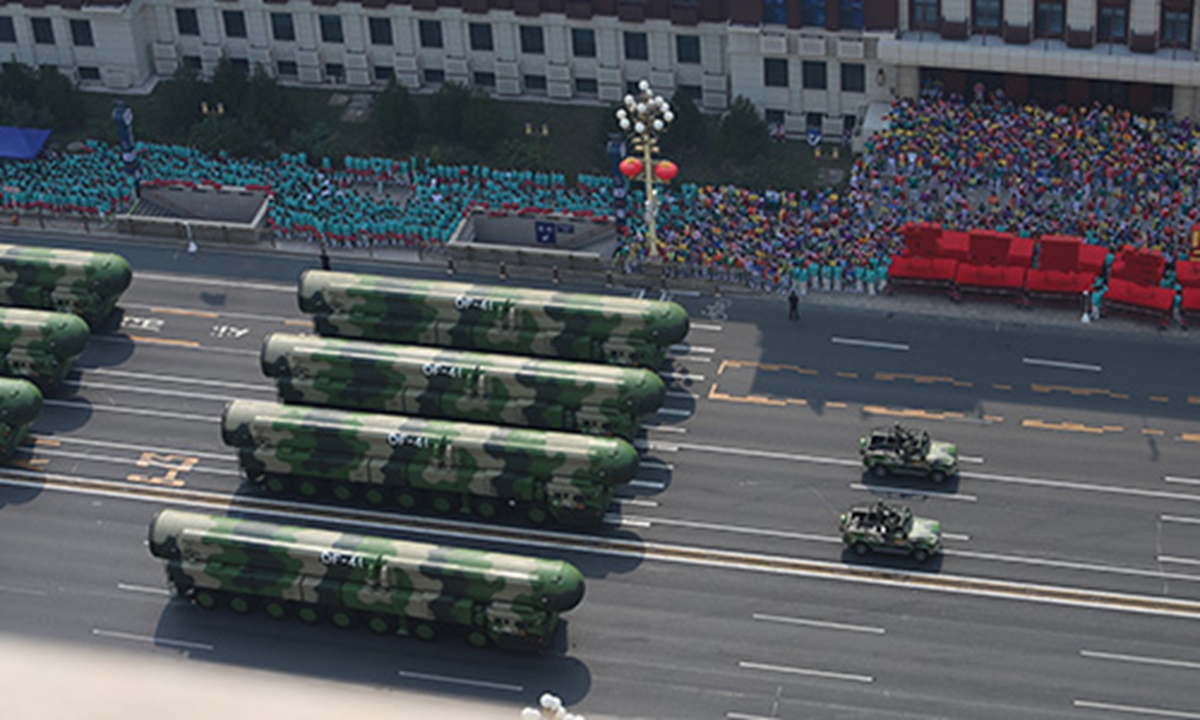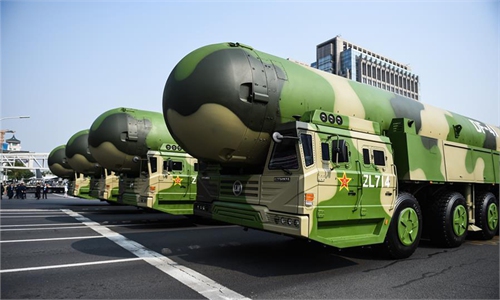Pentagon report intends to weaken China’s nuclear deterrence: Global Times editorial

China reveals its most advanced nuclear-armed intercontinental ballistic missile, the DF-41, at the National Day parade in Beijing on October 1, 2019. Photo: Fan Lingzhi/GT
The US Department of Defense on Tuesday released its 2020 Report on Military and Security Developments Involving the People's Republic of China. Compared to reports in past years, the latest one says China currently has a nuclear warhead stockpile in the low 200s, and predicts the number will at least double over the next decade. This has attracted international attention on China's nuclear arsenal.China has never publicized the number of its nuclear warheads, which is in line with China's low-key nuclear policy. China is the only nuclear power that has promised not to be the first to use nuclear weapons, and not to use or threaten to use nuclear weapons against non-nuclear countries. The outside world has been speculating about the size of China's nuclear arsenal, but this was mainly done by non-governmental institutions, such as think tanks.
Since the 1980s, many think tanks have believed China has more than 200 nuclear warheads. The number has not changed much. The Stockholm International Peace Research Institute and the Federation of American Scientists in recent years have put the number of China's nuclear warheads at 320, which has been widely cited. But China has never confirmed these figures.
The US Department of Defense has released 20 such reports, but this is the first time that it has given an assessment of the number of China's nuclear warheads. The Pentagon intentionally affected people's understanding of the size of China's nuclear arsenals.
We believe the number of "low 200s" is smaller than in people's perception, and this is an intentional underestimation. At the same time, the report said China will at least double the number of nuclear warheads over the next decade, which sends a deliberate message to the US and world that China is accelerating the expansion of its nuclear arsenal.
The Pentagon has two purposes. One is to weaken China's nuclear deterrence, especially the role of China's nuclear capability in shaping American society's attitude toward China. The US is launching a strong strategic suppression against China, causing tensions in the South China Sea and the Taiwan Straits. The US military hopes to downplay the anxieties this has caused to American society, stressing that the US has an overwhelming strategic advantage over China. So no matter how the US military provokes China, Americans don't have to worry.
The second goal is to condition the international community's basic understanding of China's nuclear strength on low 200s, so that it can use the figure as the base to pressure China's nuclear disarmament with the US and Russia, and squeeze China's ability to strengthen its nuclear power.
The US is forcing China to take part in nuclear disarmament negotiations when there is still a large gap between China and the US, so that the US can always maintain an overwhelming military advantage over China, and suppress China's will at critical junctures.
China develops nuclear weapons solely for self-defense, so China will not pursue the same scale of nuclear arsenals as the US. But China's nuclear deterrence must be strong and effective. As the US increases military pressure on China, China's nuclear power must upgrade to hedge against US pressure.
Since Trump took office, he has not been rest assured even that the US has already owns one of the world's largest nuclear arsenals, and increased funding to upgrade US nuclear strength. We are compelled to believe the US is also targeting China for doing so, as the US considers China its top strategic competitor.
China should maintain the development and growth of its nuclear strength, and ensure that its nuclear deterrence is powerful enough to deal with the strategic pressure and challenges it faces. This is one of the key issues to ensure China's national security. The US claims China will double its nuclear warheads over the next decade. There is no doubt that China has the capability to do so, but whether China will do so depends on the extent of US threats to China's security. In other words, it depends on the urgency for China to strengthen its nuclear capability.
The Pentagon's annual report on China's military development has always promoted the so-called China military threats. It's no exception this time. But the latest one intends to suppress China's nuclear deterrence. It's believed China's nuclear policymakers can see through it. How to develop nuclear weapons is China's agenda. We love peace, and clearly know that peace is not something to beg for. Washington cannot use its public opinion war to influence China's nuclear policy.

